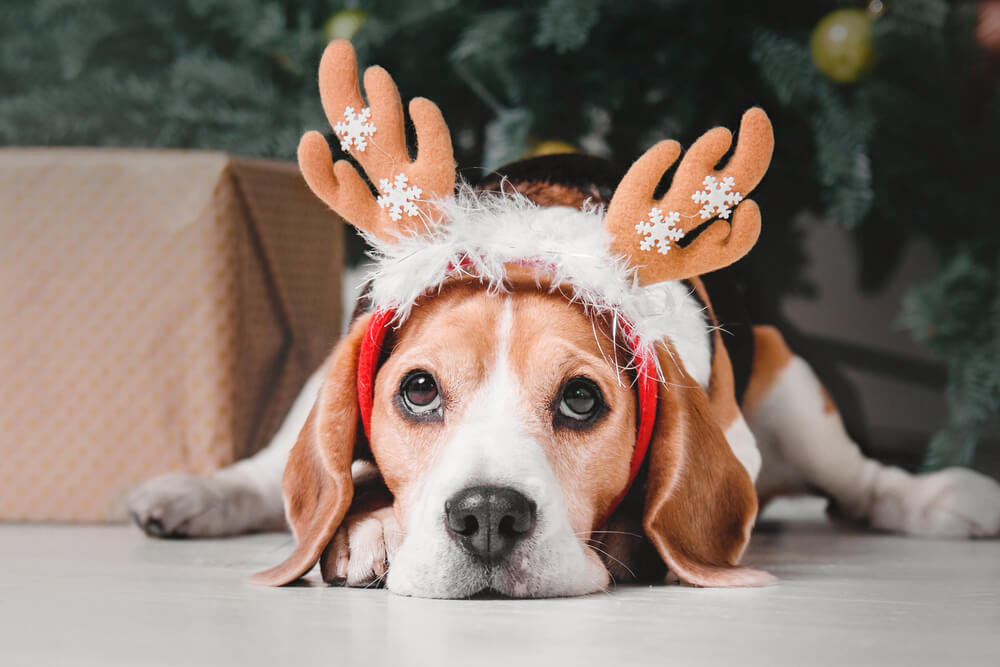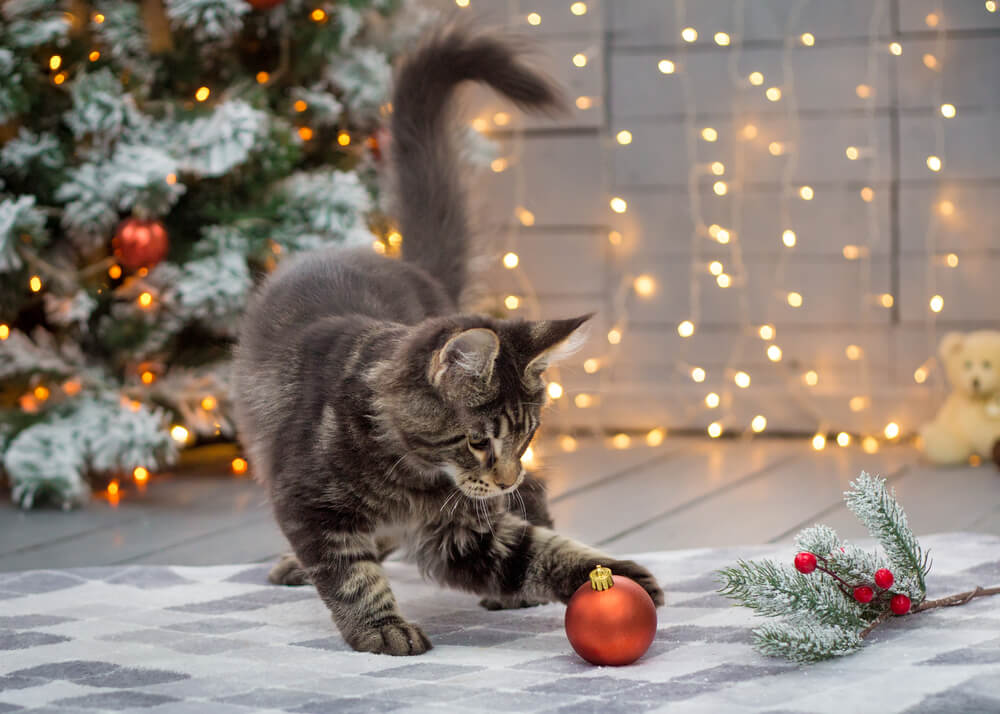
The holidays will soon be here, and you likely will be indulging in cheesy hallmark movies, gift exchanges, cookies, and way too much food. While you’re enjoying the season’s indulgences, don’t forget that some of the same things that bring you holiday cheer—including food, decorations, parties, and guests—can be dangerous for your pets. Towne Centre Animal Hospital wants you to enjoy your holiday season without fear of a pet emergency, so we’ve put together a list of holiday do’s and don’ts to keep everyone safe this year.
DON’T feed your pet holiday foods
Including pets in the holiday meal may seem like the right thing, but this can quickly backfire. Many popular holiday dishes contain foods that are toxic or difficult for pets to digest, resulting in the following:
- Food toxicity — Chocolate, xylitol (i.e., an artificial sweetener), raisins, garlic, onions, macadamia nuts, and raw bread dough are common holiday foods toxic to pets. Signs and severity range from mild gastrointestinal (GI) upset to death, based on the toxin type, your pet’s weight, and how much they consume.
- Pancreatitis — A sudden intake of high-fat foods can cause pancreatitis in your pet, and result in fever, lethargy, vomiting, diarrhea, and stomach pain. Pets with pancreatitis usually need hospitalization for several days to hydrate and recover.
- GI tract obstruction—Indigestible items like bones and corn cobs can puncture or obstruct your pet’s intestines, which can be life-threatening, and typically require emergency surgery.
Avoid sharing table foods with your pets, and remove and store trash in a lidded pet-proof container as soon as possible after cooking or serving a meal.
DO offer pets a special pet-safe holiday meal
If you want to include your pets in the celebrations, offer them a home-cooked meal of plain, white, skinless turkey meat or other lean meat, and vegetables cooked without any butter, oil, or spices.
DON’T decorate with toxic plants
Holly, mistletoe, and poinsettia are unlikely to kill your pet, but pets who chew or eat them may drool, vomit, and have diarrhea. Most lily varieties, on the other hand, are highly toxic to cats, and only a small nibble can cause serious kidney damage.
DO check the ASPCA’s list of toxic and non-toxic plants
If you aren’t sure which plants are safe around your pets, check the ASPCA’s list of toxic and non-toxic plants. Consider using faux silk plants and flowers, available at your local craft or hobby store.
DON’T let party guests or noise overwhelm pets
Strangers in your home can upset some pets, especially those sensitive to noise and chaos. However, if your pets enjoy guests and are well-behaved, allow them to intermingle, but set ground rules, such as “Please don’t feed Rufus,” or “Please pet Fluffy only on his head,” to ensure safe interactions.
DO give pets their own quiet, safe space
Keep pets who feel intimidated by strangers in a safe, quiet area away from the main party, with cozy bedding and familiar toys. This strategy is also helpful for pets who are sensitive to loud noises, such as fireworks. If you know of a nearby fireworks show, or you think your pet needs help with other anxieties, consult with your veterinarian about prescription supplements or medications.
DON’T underestimate pet curiosity and climbing ability
Some pets may not be able to reach items or food placed on shelves or countertops, but large dogs can jump onto countertops and cats can get into tiny spaces, including narrow ledges and shelves. Remember that pets will investigate any new items in their environment, so don’t place breakable decor items where pets can easily knock them down, and supervise pets when they’re nearby.

DO restrict access to potentially dangerous items
Some decor is not only breakable, but also downright dangerous to pets. Snow globes may contain lethal ethylene glycol, lights and ornaments can shatter and cut your pet, candles can burn your pet or start a fire, and chewed electrical cords can cause a nasty shock, mouth burns, or a house fire. When you can’t directly supervise your pet, restrict their access by securing them in a crate or another room. Unplug cords and blow out candles before bed and when you leave the house.
DON’T let pets drink Christmas tree water
Stagnant tree water may contain fertilizers, bacteria, or molds, which can all harm your pet. Provide adequate fresh water that’s changed daily so your pet will be less likely to seek the tree water, and keep the tree water basin covered to prevent access.
DO secure the tree to prevent tipping
Christmas trees can tip and fall if your curious pet likes to climb them, so secure them to the ceiling or walls with commercially designed products. You can also gate off the tree area, place deterrents like scat mats or foil, or keep pets who can’t resist the temptation out of the room completely.
Sometimes accidents happen, despite our best efforts. If your pet finds their way into trouble this holiday season, or if you’d like to discuss medications to relieve holiday anxiety, call us and schedule a visit with the Towne Centre Animal Hospital team. If you have an emergency during a holiday closure, contact a local veterinary emergency hospital, or call the ASPCA Animal Poison Control hotline for assistance if your pet ingests a potential toxin.
